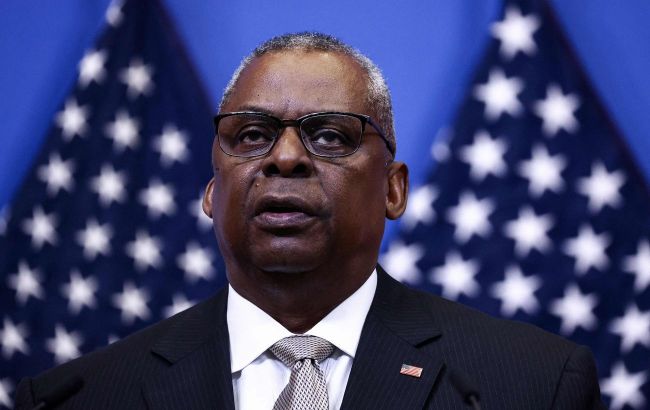Lloyd Austin has cancer: Pentagon chief's secret hospitalization and U.S. response
 Pentagon chief Lloyd Austin (Getty Images)
Pentagon chief Lloyd Austin (Getty Images)
The United States Secretary of Defense, Lloyd Austin, has been diagnosed with prostate cancer. Complications arising from the surgery led to his hospitalization, which was initially kept from the public and even the White House and President Joe Biden for several days, triggering significant political reactions.
Details about Austin's secret hospitalization and the reactions from the Biden administration are outlined in the following RBC-Ukraine's article.
The following sources were used in the preparation of the material: the Pentagon press service, the White House, CNN, Politico, Voice of America, The Hill, The Wall Street Journal, and Reuters.
Austin's hospitalization
Representatives from the Walter Reed National Military Medical Center, where the U.S. Secretary of Defense is undergoing treatment, disclosed that Lloyd Austin underwent a "minimally invasive procedure" on December 22 to treat prostate cancer. However, complications emerged following the surgery.
Doctors said that Austin had recovered and returned home the morning after the surgery. They emphasized that the prostate cancer was detected at an early stage, and the recovery prognosis was excellent.
Nevertheless, on January 1, Austin was rehospitalized due to complications resulting from a urinary tract infection and fluid accumulation in the abdominal cavity. Consequently, he was transferred to the intensive care unit.
Pentagon delayed informing the White House
Surprisingly, news of the U.S. Secretary of Defense's hospitalization was not immediately relayed to President Joe Biden and the Deputy Secretary of Defense, a departure from the usual expectation for high-ranking officials in the U.S. government. The White House only received information from the Pentagon with a three-day delay.
This prompted criticism of the Defense Department for allowing the Secretary of Defense to be absent from his duties for an extended period without informing senior members of the administration.
On January 4, Austin's Chief of Staff notified White House National Security Advisor Jake Sullivan about the minister's hospitalization. Initially, Pentagon spokesperson Major General Pete Ryder claimed that Austin had the flu, leading to a delayed notification.
In response to questions about why Austin did not disclose his prostate cancer diagnosis, Ryder said that the situation was "deeply personal."
"He is no longer in the Intensive Care Unit and is recovering in a more private area of the hospital. He continues to experience discomfort but his prognosis is good," said the official.
As of now, there is no specific discharge date for Austin from the hospital.
Transfer of ministerial responsibilities
According to Pentagon spokespersons, after Austin's hospitalization, he underwent testing and evaluation, and on January 2, certain responsibilities were transferred to his deputy, Kathleen Hicks.
The Pentagon spokesperson mentioned that Austin and Hicks' staff were informed of the transfer of duties through electronic notification. In the latter part of January 4, the Deputy Secretary and the Chief of Staff of the Secretary of Defense promptly began preparing a public statement and addressing Congress. However, on the same day, they were informed that the minister planned to resume full communication and operational duties on Friday, January 5.
"Secretary Austin currently remains hospitalized at Walter Reed National Military Medical Center and is in good condition. He is recovering well and in good spirits," Ryder said.
Austin, the Secretary of Defense, has full access to operational information and can issue necessary orders using secure communication.
Austin's statement
Critics in the media and some U.S. lawmakers expressed dissatisfaction with the delayed announcement of the Pentagon chief's hospitalization. They called for a review of procedures for informing the administration and the public if high-ranking officials cannot fulfill their duties.
In a statement released later, Secretary of Defense Austin expressed eagerness to return to the Pentagon soon. He acknowledged concerns about transparency raised by the media, admitting that there could have been better communication to keep the public properly informed.
"But this is important to say: this was my medical procedure, and I take full responsibility for my decisions about disclosure," Austin said.
Pentagon Chief's battle with cancer
Despite the initial information from Pentagon spokesperson Ryder, The Wall Street Journal reported that the U.S. Secretary of Defense is undergoing treatment for complications caused by prostate cancer.
Additionally, on January 9, the Pentagon informed journalists that Austin is hospitalized for prostate cancer treatment. Medical professionals emphasized that the minister's condition is improving, although he is currently still in the hospital.
"He continues to make progress and we anticipate a full recovery although this can be a slow process," said the doctors in their official statement.
Reuters reported that as of January 9, President Biden was unaware of Secretary Austin's prostate cancer diagnosis.
"Nobody in the White House knew that Secretary Austin had prostate cancer until this morning, and the president was informed immediately after," said White House spokesperson John Kirby.
Biden Resists Calls to Oust Austin Amidst Criticism Over Hospitalization Delay
Republicans, including former U.S. President Donald Trump, have viewed the incident of delayed reporting on the hospitalization of Lloyd Austin as "evidence of Austin's dereliction of duty."
Meanwhile, the White House says that the U.S. President has no intention of firing Lloyd Austin, even after he failed to publicly disclose his hospitalization for several days and did not provide information about his illness.
"There is no plan for anything other than for Secretary Austin to stay in the job," White House spokesman John Kirby told reporters, but added that such communication is not "optimal."
Austin and Biden last spoke on Saturday. According to the WSJ, both times the Secretary of Defense was hospitalized, he refused to inform the White House and delegated Pentagon management responsibilities to his deputy.
In turn, Pentagon representatives said that Austin's hospitalization did not hinder operations abroad and that U.S. national security was not compromised.
Who is Lloyd Austin, and what does it have to do with assistance to Ukraine?
Since 2020, Lloyd Austin has served as the U.S. Secretary of Defense, appointed by the President. A retired four-star general, he became the first African American to lead the Pentagon in history. Before that, from 2013, he held the position of the Commander of the U.S. Central Command.
Austin is a key figure, and the provision of assistance to Ukraine, a crucial ally, depends in part on him. He chairs the meetings of the Contact Group on Defense of Ukraine in the Ramstein format, where allies make important decisions regarding military support to Ukraine.

